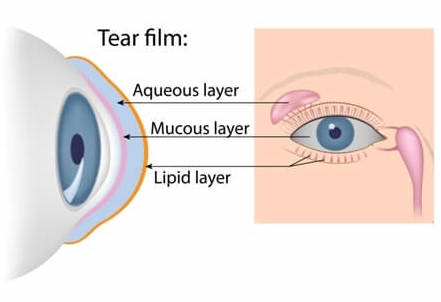Got Dry Eyes? It May Be Time for an Eye Exam
November 14, 2023
Are your eyes dry, itchy, or causing you discomfort? You're not alone.
Every day, people worldwide visit their eye doctor, hoping to find relief for their dry eyes. According to the American Academy of Ophthalmology, approximately 20 million people suffer from dry eye syndrome.
Dry eye syndrome is a chronic eye condition that can cause frustrating symptoms of irritation. The good news is that you don't have to live with these symptoms.
Keep reading to discover when it could be time for an eye exam if you have dry eyes!
What Causes Dry Eyes?
 Dry eye occurs when there is a lack of sufficient moisture. In most cases, this is because tears evaporate from the eye too rapidly or the eye does not produce enough tears.
Dry eye occurs when there is a lack of sufficient moisture. In most cases, this is because tears evaporate from the eye too rapidly or the eye does not produce enough tears.
The eye may also produce poor-quality tears that lack the proper nutrients to keep the eyes healthy and well-lubricated. It is also possible for tears to evaporate from the eye too quickly and for the eye to not produce enough tears at once.
Healthy eyes maintain a constant layer of tears that coats their surface. This is known as the tear film.
When you blink, tears are distributed evenly. Not only is this smooth, wet surface important for your comfort, but it is also essential for clear vision. They help your eye to focus.
Meibomian gland dysfunction (MGD) is the most frequent culprit behind dry eye. Most people with dry eyes have it because of meibomian gland dysfunction.
In addition to water and mucus, tears contain oil, which prevents them from evaporating from the eye too quickly. The meibomian glands, located in the eyelids, produce this oily element.
In the case of MGD, the meibomian glands do not function properly. As a result, tears do not remain in the eye long enough.
Another cause of dry eye is insufficient tear production. If your eyes are not producing enough tears, they can't stay healthy. A range of factors can affect tear production.
Who Can Have Dry Eyes?
Dry eyes can affect anyone. However, some factors can increase your risk of developing the eye condition.
One factor is age. You are more likely to develop dry eyes as you get older. This is because the aging process can decrease the efficiency of tear-producing glands.
Some conditions and medications can increase your risk of developing dry eye. Such conditions include diabetes, rheumatoid arthritis, Sjögren's syndrome, thyroid disease, and blepharitis.
Medications that may lead to dry eye as a side effect include beta-blockers, antihistamines, and antidepressants. Extended use of contact lenses can also trigger dry eye symptoms.
Your environment may lead to the development of dry eye symptoms. A smoky, windy environment can make it harder for your eyes to maintain moisture.
Dry eye syndrome is more common in women than men. Fluctuating hormones can affect both the production and quality of tears. Post-menopausal women are particularly at risk. However, you may still develop dry eyes for other reasons.
Signs That Your Eyes Are Too Dry
 Some dryness is typical in certain situations, such as when you've spent too long staring at a computer screen and haven't blinked enough. But how do you know when it's time for an eye exam?
Some dryness is typical in certain situations, such as when you've spent too long staring at a computer screen and haven't blinked enough. But how do you know when it's time for an eye exam?
If you have dry eyes, other symptoms are associated with the eye condition. Dry eyes do not only feel "dry."
Many patients experience a gritty or scratchy sensation, saying something feels stuck in their eyes. You may also experience stinging, burning, or itching.
Some dry eye symptoms are noticeable by looking at your eyes in the mirror. Many dry eye patients find that they have red eyes. You may also notice mucus around your eyes, especially after waking up.
Another common sign of dry eye is eye fatigue. You may find your eyes feel tired, heavy, or achy when they are too dry and not getting the moisture they need.
The irritation puts stress on the system of your eyes. You may also experience headaches. Although it seems counterintuitive, many patients with dry eyes find their eyes feel more watery.
When your eyes are irritated, it is a natural response for them to produce more tears. Tears are one of the key ways your eyes try to remove the source of irritation.
However, if your eyes are watery because of dry eye syndrome, this will not fix the problem. It will likely make it even worse.
Excessive watering will make your vision blurrier, making it more challenging to see. Dry eyes can make it uncomfortable for you to wear contact lenses.
Contact lenses limit the amount of oxygen reaching your eyes. This makes it even harder for them to produce adequate tears.
Because of all these signs, dry eye syndrome can make everyday activities challenging, including if you're working or enjoying yourself for fun.
How Do You Treat Dry Eyes?
If your eyes feel dry regularly, the next step should be to schedule an eye exam with your ophthalmologist at Metropolitan Ophthalmology Associates. They will determine if you have dry eye syndrome and recommend the best treatment.
We offer a variety of dry eye treatments, including artificial tears in the form of eye drops or gels. These are usually very effective for many patients and are often the first recommended treatment.
We may also recommend punctal plugs placed in the openings of the tear ducts to reduce the drainage of tears. Another way to help symptoms associated with dry eyes is omega-3 fatty acids.
Adding omega-3's to your diet can help improve tear production and quality. You can eat foods like fatty fish, walnuts, or flaxseed to increase how many omega 3's you consume, or your ophthalmologist can recommend a supplement.
Are dry eyes a part of your daily life? They don't have to be. Request an appointment at Metropolitan Ophthalmology Associates in McLean, VA, and Chevy Chase, MD, today to find relief for your dry eyes!



